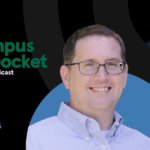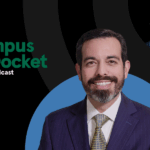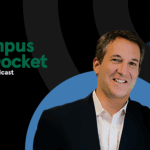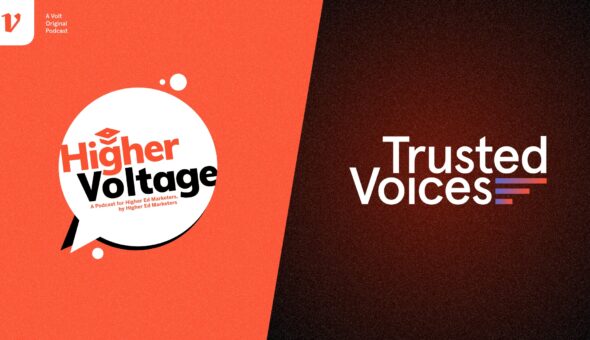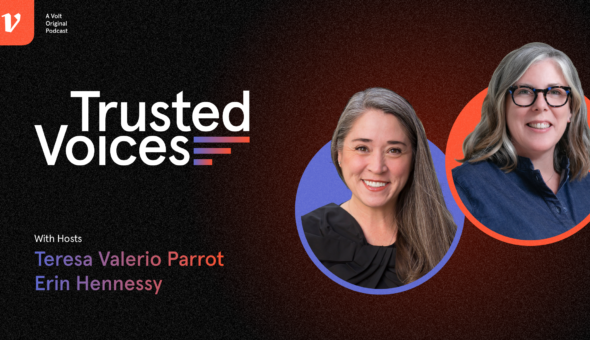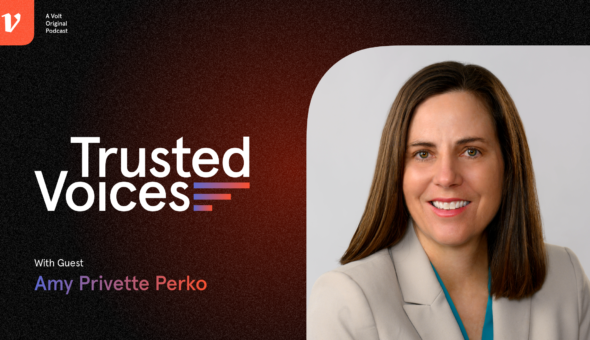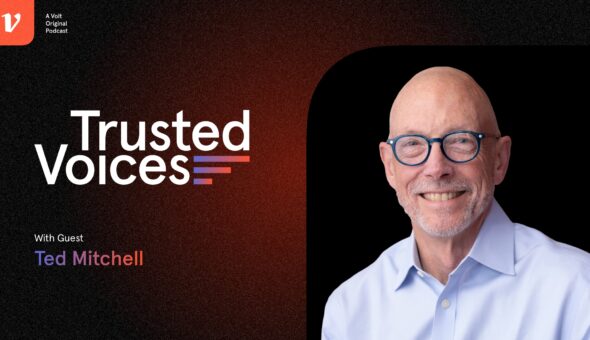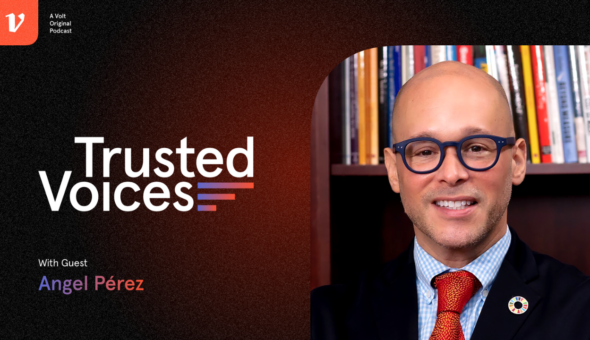Hank Green did not come to higher education through years of industry experience. He came to it as a former higher ed consumer, himself, and as an entrepreneur and curious problem solver. And what he found as he dug in is an industry locked in a never-ending escalation of cost and rejective standards that leaves far too many students saddled with debt, but without the benefit of a degree—in fact, an estimated 40 percent of all student debt holders have not completed a four-year degree.
“We have to do something,” he tells Kevin Tyler on the latest Higher Voltage. And that something is Study Hall, a new platform that allows students to enroll in affordable online courses to earn college credit. Green and his brother, John, launched Study Hall earlier this year in partnership with Arizona State University; students can enroll in courses for a small fee and earn transferable credits from ASU when they successfully complete their courses and pay an additional fee that is still well below the average per-course cost at a traditional university.
It is a different experience than the traditional college experience, and Green knows that.
“I’m not saying it’s the exact same experience. It’s not. But we have to do it,” he says. And this experience is one built on digital engagement and flexibility to meet students where they are in their lives.
“How do you hold attention? That’s the whole ballgame in 2023, and we have tricks for that,” says Green.
Listen to the full episode to learn more about how Study Hall hopes to make higher education more accessible and debt-free.
Recorded Wednesday, March 22
Show notes:
- Hank and John Green launch program that allows people to earn college credit with YouTube courses – NBC
- Vloggers Hank and John Green Want You to Take College Courses on YouTube – Buzzfeed
- “How to College” – Study Hall
- Partnership between ASU, YouTube, Crash Course expands to offer courses for college credit – ASU release
Read the full transcript:
Kevin Tyler:
Higher voltage is brought to you by eCity Interactive. For over 20 years, eCity Interactive has created websites and digital marketing strategies and solutions for colleges and universities that deliver results and exceed expectations. Their latest offerings to higher ed clients include enrollment funnel diagnostics, and enrollment support services that efficiently attract and engage potential applicants with results you have to see for yourself. To learn more, visit ecityinteractive.com.
Hello and welcome to Higher Voltage, a podcast about higher education that explores what’s working, what’s not, and what needs to change in higher ed marketing and administration. I’m your host, Kevin Tyler.
Welcome back to Higher Voltage. I’m very excited about today’s guest, Hank Green joins us for today’s episode about his newest endeavor, Study Hall. Hank Green is the New York Times bestselling author of An Absolutely Remarkable Thing, and a Beautifully Foolish Endeavor. He is a science communicator, video creator and entrepreneur having founded Complexly, Subbable, VidCon, and DFTBA.com. He’s the host of Crash Course and SciShow, and you can find him on YouTube and Twitter, also on TikTok. Welcome to the show, so happy to have you here, Hank. I’m excited to have this conversation with you.
Hank Green:
Thanks. I listened to your podcast. I had an excuse to do it, and I often feel like there’s not enough people who talk about the complexities and the evolution of higher education, which is just the most, from an insider perspective, not just some folks who got angry about something. It seems like higher ed travels around along with some controversy or another, or with student loan conversations or whatever, but to actually be in it and talk about it is so much more valuable, because otherwise you’re just freaking out all the time instead of aware that there are people trying to work on the solutions and that there’s complexities and there’s reasons why these things are hard. That’s great.
Kevin Tyler:
Well, I appreciate you taking the time to listen, and I appreciate you saying that. I think that having these conversations openly and being real about what’s happening and what can be done about some of the things that are creating barriers and obstacles to people’s access is really important. I think it’s something we talk about behind closed doors quite often, but nothing that’s really in the public, along with solutions, the one that you have started actually. And so I’m really excited to dig into your most recent project, Study Hall, which is a partnership between ASU, Arizona State University, YouTube and CrashCourse. And I just want to know first off, how this works. For instance, how is it different from ASU online, and how significant a step forward do you think this is for higher education?
Hank Green:
So the basic idea here is that people use YouTube a lot. They use YouTube for learning, they use YouTube for play. I have been making YouTube videos since 2007, and when you are in the environment of YouTube doing education, you both have the advantage of education where the student kind of has to do it. So there’s that lever that you’re turning, but you are also with this sidebar that is full of Mr. Beast videos and whatever else. And not Mr. Beast, but whatever the YouTube algorithm has identified as the most enticing thing for that specific person. And so you do maybe have to do a little bit of extra work to keep their attention. And that’s what we have always tried to do at CrashCourse by making really good stuff that’s available for everybody right now who speaks English. But we’re making some Spanish language stuff and we’ve made some stuff in various languages.
And that challenge is a challenge, because sometimes chemistry’s boring. If it was really easy, people would just do it. Instead of watching television, they’d learn chemistry. So it is a little bit hard, but I think there are ways to do it and you can sort of use those simultaneous levers of you do need to learn this and it will be valuable for your future and also for your near term future of passing a test. But also we do want to try and make this interesting, add some characters to the story, so at least people understand why this might be both relevant to their future, but also interesting. There is interestingness here, because the world is pretty fascinating. So that’s the base place to start from. And then this has been going on for over 10 years on CrashCourse. We’re very precious about it.
Everybody sees this as a juicy thing that they could grab and do something with. People see the value, and I do too, but we’re very cautious about it. And once the thing exists, I become very cautious. Before it exists I’m reckless and terrible and make big problems for myself and my family, but once it exists I’m like, ugh, someone else could ruin this for sure. So when YouTube, some of our friends at YouTube who we of course knew well first introduced us to some people at ASU, I was like, okay, great, another person, another potential partner who would want to get in on what we have. But we had been thinking about the fact that we exist or existed really on the outside of the system. So it’s sort of like, here is a thing, and if you would like it, you can have it. And that’s all we say.
We will listen to teachers and we will listen to students, but it’s just here, take it, if you want it, have it. If not, no problem. And that’s the business model, and it’s free. And so that can kind of work. It’s not a great business model. Thank God for people who have supported us either granting agencies or we also function on a crowdfunding model. So anybody’s who’s ever bought a CrashCourse coin or supported us on Patreon, that’s the reason we can do this, and I’m so grateful. To go from there to actually interfacing directly with the systems of higher education and high school, which we’ve also started to think about a little bit. It is a huge step for us and also something that we wanted to do with people who shared some of our values and knew what was going on, which we didn’t. I have to be honest, my understanding of how colleges work and how higher ed works is mostly entirely based on my experience from 1998 to 2002 being a student in a college. That’s what I know.
Kevin Tyler:
I hear you, I hear you.
Hank Green:
So to have some of that expertise coming in, and it was people at ASU, but it was also people who they have worked with who don’t work for ASU, but understand pieces of this puzzle to be in the same room and who had worked on the ASU’S partnership with Starbucks and some other cool stuff. And my dad is our chief advisor for our business. It’s really great to have this guy who’s insatiably curious in the moment. His sons are doing anything at all. He’s like, I will become an expert on that topic. We had this conversation and my dad knew about it and he emailed me and he said, “Hank, I think this is one you should take seriously.” Specifically because of their mission. I’m sorry this is a long story.
Kevin Tyler:
That’s okay.
Hank Green:
It’s a genius mission because it recognizes a problem that is pretty invisible to a lot of people, which is that the entire setup of the US higher education system, we value a university based on how many people they can reject. That’s a huge important stat, he’s making a face, it seems like he’s on board with it.
Kevin Tyler:
I’m making, yes, it’s such an important thing to say as often as possible.
Hank Green:
Yeah. And ASU was, I don’t know exactly what the language is, but it’s like we judge ourselves not by who we reject, but by who we accept and how many people we can accept and provide a great education for. And that’s a big unlock to realize that that’s how the system is set up. And the K-12 version of that is we’ve based our funding education on property taxes where it’s just, if you say things out loud, suddenly you’re like, oh my God, it’s broken. So to say it out loud and to say, we’re going to do it a different way, and not just to say it, but to have done it for a couple decades, and to have a demographic of your university that’s reflected of the demographic for the place where you are, to have a huge percentage of first generation students to have lots of options, lots of different ways of doing it, to be innovating in lots of different ways.
Because I learned so much in this process that I feel ashamed for not having known as a person who is doing this, but to not understand that the cost for many students, the biggest part of the cost isn’t the price, it’s the lost income. And so if you can’t do college while working, or if the college experience is set up and designed for students who do not have jobs, which mine absolutely was, very few of my classmates worked. There was work study where you worked at the library. To not even understand that or that lots of people have to balance caregiving along with their educations. And so if you have to be at a class at every week at the same time, that’s a huge barrier to higher ed for people. And I’m not saying that it’s the exact same experience to have a not in-person experience. It’s not, but we have to do it. We exist inside of the society. We exist and we have to provide the tools that we can given that.
It honestly was a little bit of decision of is this going to be a tool that we could leverage to be the kind of thing that really engaged parents and students would buy or really well-off school systems would be able to buy services that we provide. And that becomes the business model, which honestly is more comfortable for me because that’s more the world that I understand, and especially selling to consumers, I have other jobs and one of those other jobs is that I sell merchandise for YouTubers. And so I understand that world. We sort of talked about it and we were like, okay, so if you have this tool, you could do a lot of different things with a tool, but you can’t do everything with it because you only have so much time.
So what’s the thing that we most want to do? I feel like the people at ASU kind of convinced us that the thing to do was to understand the parts of the process that are creating the most harm, and it’s not fun to talk about it as harm. And it became very clear that the biggest harm that is being done by higher education is people who have loans and no degree, which is a lot of people.
Kevin Tyler:
A lot of people.
Hank Green:
It’s like over 40%-
Kevin Tyler:
40 million.
Hank Green:
Of people who have loans aren’t going to get a degree.
Their loans tend to be smaller because they didn’t finish their education, but they also don’t have the value of the education. They have some of it, but not the thing that our society thinks is the most important part, which is the piece of paper that says you did it. And so we were like, okay, let’s use some tools that ASU has, which you mentioned ASU online, well set up, well understood, effective. And they’re earned admission program also, which for people who aren’t familiar, it’s basically if you complete certain classes and you get certain grades, you are in ASU, you don’t have to apply.
And so to use those existing tools and our existing tool of CrashCourse and our ability and expertise and making videos that convey information effectively and YouTube’s existing tools of YouTube, and a big audience of people who are on the platform, although that’s a tricky thing because they’re not going to push a button and make the algorithm like us. You still have to [inaudible 00:11:48]. So to combine all those things in a way that’s very aware of each of the problems that are most standing in the way of more people having access to higher education.
Kevin Tyler:
Yeah, yeah. I was thinking about this as I was doing the reading and watching videos, and this isn’t exactly like a challenger brand. It feels like a bridge brand. You’re getting people from one place into another without really threatening the way education looks and exists currently. There are some questions to be raised and asked about the way education is delivered at the higher ed level, of course right now and how it can evolve. But the way that A, I think you put it really well conveying information effectively, these videos really break down very well, what it means to go to college, how you make certain decisions, what kind of jobs exists nested underneath a major, all of the information that a lot of people just don’t have at their fingertips anymore as these populations start to shift.
And I feel like the timing of this effort is so important as we see, like you said before, the quality of an institution being assessed by how many people it rejects at a time when more people need access to education than ever before. And I just think it’s a really interesting and innovative approach that doesn’t seem threatening to the structure of higher ed as it exists now.
Hank Green:
Yeah. And I mean, I’m happy to see people threatening the structure of higher ed in different ways. That’s fine. I think that there has never been one way to do it, and there will continue to be more ways to do it. That’s the story of all media. I’m a media person. And lecture is media, and education is to some extent, not all, but to some extent it is content. And you raise an important thing. I think that it’s easy to write, when you’re writing a headline, you’re trying to get people to click on your article. And so you want to write that headline in a way that makes it seem like this is a big challenge to higher ed. And to some extent it is. There’s a piece of the business model here that it is a threat to, which is that first year courses are profit generators for institutions, because they cost the same amount as any other class, but there’s a lot more students per teacher and lots of things. I’ll just put that one out there.
There’s other reasons why that I don’t necessarily want to get into, but it’s surprising how, of course it is, but it is this way. But it’s surprising how complex the sort of model is because the idea really is let’s get you some credits so you don’t have to take some classes, so that the whole experience is cheaper. And also the ramp is more gradual. So there’s not a big wall to go over. There’s an easier thing to climb up. What we’ve been doing before we announced this is a lot of what you were just talking about, which is creating content for people who are considering higher education to think about it and understand it better, because that’s something that a lot of people take for granted, especially a lot of people who have been through it because you’ve been through it and you forget what you don’t know.
And identifying those barriers, a big one is that you can make an expensive mistake. And you spent a bunch of time and a bunch of money getting something that’s not actually going to help you get your degree, or you didn’t know what sort of program you were in, or you went to a school that wasn’t the right school or maybe was even one of the for profit things that aren’t great. So to try and provide some information for people so that they will make fewer mistakes because those mistakes can cost quite a bit of money. And also to really, I think that everybody in the higher education industry should look at the number of dollars that have come from students who didn’t get degrees and see that as a crisis. And we talk about this, the broader student loan crisis, but I think that that’s the really specific crisis because that’s a failure of the institution to some extent.
It marketed itself as being able to provide a value, and it was not able to provide that value. And that’s not a ITT tech problem. It certainly is worse at some places than others, but it’s a problem across the entire, unless it’s a very sort of selective institution that has amazing graduation rates because they’re only pulling students who are the best in the world. Those rates of getting loan dollars from students who you said, you can make this happen, but you and the student together couldn’t make it happen. And I think that that’s something to be interfacing within in a very sort of almost somber way. It is a failure. So to be looking at it and to be thinking about solutions, I think is kind of everybody’s responsibility.
Kevin Tyler:
Totally. Totally. Let’s talk about the offer of study hall real quick. I love the model for lots of different reasons, but anyone anywhere can watch, first of all the fast facts and the how to college videos, which are completely accessible, free for anyone to watch. They are excellently produced and organized chunks of content that are really do a great job of breaking down or demystifying the exploration of college, which I really, really appreciated. But anyone can watch those. You can pick, the classes just launched on the seventh, correct? Of March. But anyone can watch those. And once you decide on a direction, you pay 25 bucks to basically enroll. And at the end of that course, if you’re satisfied with your grade, you can pay 400 bucks to get the credits. If you are not satisfied with your grade, then you can retake the course as often as you want until you’re satisfied with the outcome. Is that correct?
Hank Green:
Yep. We’ve been uploading the videos. So there’s three sets of videos just for clarity. There’s the how to college videos, which is just how college works. There’s the fast guides, which are how individual majors work and why people get different majors. And then there’s actual courses. And the courses we’ve been uploading and people are like, “Why are you uploading this on a different channel than CrashCourse?” And it’s like, wait, I can’t answer that question yet because all of the videos are there online. But if you want to enroll in the class and have a cohort and have a faculty support and get toward getting a credit, then you enroll it at the website, which I can’t remember the URL of right now.
Kevin Tyler:
It’s okay. We’ll be sure to have it on the episode page. We got you covered.
Hank Green:
It’s gostudyhall.com. There it is. Thanks.
Kevin Tyler:
There you go. So I’m glad you mentioned the cohorts and the faculty support. Because I’m really curious around, there have been other online education offers in the past. This one’s very different for a lot of reasons, but one of those reasons that it’s different is that there is a student to faculty engagement. And I’m curious how faculty provide the support that’s needed for what could become a very large student pool.
Hank Green:
Yeah, I mean I think that that’s, apologies to our first cohort of students, but it’s the thing that, and I mean to our eighth cohort of students too, it’s a thing that we will continue to be learning. We did have a sort of set number of people in the first cohort, and now we are filling up another one to yeah, we didn’t want it to say, okay, we can do this, but ASU has infrastructure for this, which is why I’d much rather work with them than try and build something like this myself. And their ASU online systems work I believe in this way, there is a cohort and there is faculty support. And to figure out how to do ideally two things at once, which would be to allow more people into a system like this, and also keep the cost going down, and maybe a third thing to increase the quality.
I think that you do have to look at other potential solutions that might be like if you have to, this is the story of everybody who’s actually good at something. If you’ve taken this class, you get a chance to help out other students like UTA. And that’s actually, I think, extremely valuable for the TA. My experience was I didn’t really understand things until I started teaching people them, to hit it from four different angles where it’s like, this is how it works in my brain, but it doesn’t work in their brain, so I have to talk about it in a different way for them, you get around the concept a lot more fully, and so there is value to be delivered there, but there might also, in terms of a TA learning better and learning how to teach some, but there also might be value delivered in the form of money.
It may be that there’s a kind of internship model there that’s paid, but I don’t know. We have to continue figuring that stuff out when it comes to scaling. And right now I think that we have a number of students in the program. I had the number, but I’ve forgotten it, but I was happy with it. It seems like it’s enough to be learning. There’s going to be some software bugs as well, and there’s going to be some, we’re going to understand how much support the students want and need and also the support that they’re providing for each other in sort of open places, which we’re also using tools that students are already familiar with. I think we’re using Discord for class classroom cohort conversation, which is a lot of students, a lot of people already have experience with Discord. And why build your own thing when there is a tech company that’s built a fantastic chat and community building service where you can effortlessly move between voice and text and you can build rooms really easily and can go to private chat really easily and all this stuff.
Kevin Tyler:
The first four courses that were released a couple of weeks ago are called College Foundations. That includes English Comp, college math, US History and Human Communication. And those are typically some of the classes that folks take in their first year. I’m curious if there are any other data points that you use to determine which content you would offer first, or if there is any data that you’re using to determine which courses come out next. How’s that working?
Hank Green:
Yeah. So one of the nice things about ASU online having been a thing for a while is they get pretty good data on, every school has great data on which courses are causing problems that, I don’t know, whatever you call them at at your university, at ASU, they call them killer courses. There are courses that end students’ academic journeys. And algebra is a big one. And that frustrates me a great deal. I don’t know if I want to talk about why, which is a little bit that I don’t know that we need to be doing this to ourselves.
Kevin Tyler:
If you do, you’ll have to pay a copay.
Hank Green:
I mean, you look at the problems that it causes and it is worrying, but there’s ways to teach algebra. There’s ways to learn algebra. And as long as we’re doing it the way that we’re doing it, then we should be doing that. I feel like I’m going to get, I don’t know how many people listen to this? Hopefully it’s not enough that I’m going to get attacked, but my thoughts on algebra are complicated, I guess I should say. But also with ASU online and with other courseware solutions that do this, you see the points, the places, the classes, the individual concepts that are the weed out points. I heard Netflix talking about this once with House of Cards, back when Netflix was hot stuff. And they were like, we could see that in the first episode of House of Cards that if people got past a certain point when it, I’m not going to tell you what it was because it’s kind of sad. It’s like bad vibes, past a certain point in the first episode, they were going to be hooked.
And if they stopped watching at that point in the first episode, then they weren’t the right people for this show. They had learned something about this show that was like, that’s not for me. I’m going to go watch Family Feud. So you can see those drop off points. And they aren’t just like, this course did it. It’s like this point in this course did it. So obviously, yes, we are looking at that. We’re looking at that both intra-course and course courses individually. And those are the courses we’re focusing on. And the real World College math, ugh, it’s actually not the kind of the Algebra 1 0 1 class that you need to pass to free university. It’s more designed as a sort of college, a prep to get to that point and be ready for it.
Cause the other thing that is very clear is that the student success in America is based on their high school’s success at teaching them effectively. And a lot of students come out not prepared for in the same way. And we’re not going to fix that problem fast. We should fix that problem as fast as we can, but we should also accept that that’s the world that we’re in. And so we should be providing the ramps up that we can for the students to beat it. And frankly, my son is obsessed with math and it’s a little bit worrying because I’m not, and so I’m taking the Real World College math course so that I can be a little bit more along with him on the ride.
Kevin Tyler:
Listen.
Hank Green:
Yeah. Yeah.
Kevin Tyler:
Creating the tools you need for yourself. I get it. I hear you.
I appreciate what you said about the ramp up and students leaving high school so often unprepared. And one of the things I always try to tell the institutions I work with is there’s a time to expect a college-ready student, but there’s also a time to be a student ready college and what that might look like is going to be different for every institution. And I think the sooner that we get to more student-centered kind of approach to some of these things that as you have and the way that you’re communicating, the way college works and the fast facts and the other ways that you’re injecting some modernization in the college going process, I think that will help reframe what institutions need to be for the people they need to be for the people they exist for. Yeah. I know that you just launched, but are there any compelling data points that you’ve already discovered since the launch on a couple of weeks ago?
Hank Green:
I don’t think it’s early enough to have teased it out, or if we have to tease stuff out, it’s kind of too early to talk about.
Kevin Tyler:
Yeah, I hear you. So Arizona State has a history of innovation when it comes to how it delivers education and to whom, you mentioned the Starbucks model before, what you’re doing with them now, the study hall, does the model depend solely on ASU or could this scale to include other institutional partners who think about education the way ASU does?
Hank Green:
Yeah, I mean, I certainly don’t think that the model is limited to any individual institution. My greatest hope is that we do this, we do it well, somebody sees it and their institution does it better and solves the problems in different ways or uses some of the ways we’re doing it and puts their own tools to work. And that that keeps happening because there isn’t a way to do this. We are also aware that individual institutions are very different from each other. So I think that there isn’t one way, and pretty much every institution, maybe not a small liberal arts college or something, but every institution is trying to figure out ways to increase student success. These people didn’t get into this business to make a bunch of money and get rich. Everybody wants to see students succeed. Everybody in the higher ed business, there’s no doubt about that.
And so everybody’s trying to think about different solutions to this problem. And the more things get out there and students can decide what they’re liking and institutions can see what’s leading to success, that’s that’s good. That’s the thing to be doing. And I don’t think at all that it’s limited to ASU, I think that ASU prides itself on its innovation, and I think that they are proud to be working on this thing this way. But I think there’s definitely other, there’s lots of online programs that are very good.
Kevin Tyler:
Oh, totally.
Hank Green:
And they don’t start with a YouTube video. And I also think that there’s a lot of stuff that’s hard or impossible online. You can’t have a fume hood in your house, so you’re not going to be doing chemistry in the same way, at least. And ASU has also figured out like, oh, I love this solution.
People wouldn’t accept their chemistry credits because they didn’t have a lab component. And so they’re like, here’s what we’ll do. All these students are roughly nearby ish. We’ll give them a two week lab. It’s two weeks straight that they’re in lab. And honestly, I think that might be better than the way I did lab where I was in there two hours once every two weeks. And also, it provides one of the things that is really hard to get and that we’re trying to figure out and maybe we’ll never get, which is providing some of the same connection with other people. If you’re in a two week lab with the same 20 people, you’re going to come out with some friends because you’re going through it. It’s intense, and you’re in there. It’s not two hours either it’s six hours a day or something. It’s three hours with a break in the middle or something like that.
So you come out socialized with a bunch of people that you can, it’s going to summer camp almost. And I think that that’s a really cool value, but it’s cheaper to do it that way. So I think that there’s all of these different ways of doing it, and sometimes we can get stuck on, but we’re not providing the exact same value that we are with a certain model. And it’s like we’re not, maybe there are some things that you can’t do, but maybe there are some things that are better. And also we got to do some creative problem solving here. We can’t, can’t watch the cost of higher education, get more expensive every year faster than inflation forever.
Kevin Tyler:
Exactly.
Hank Green:
Without eventually reaching a point where the whole thing breaks. There is a time at which more than 50% of students are spending more money than they are getting value. And I don’t know when that point is, but every year that it increases, that cost increases faster than inflation, increases the percentage of students for whom that is true. That’s just math truth. And we got to do something, because otherwise the only students for whom college will be valuable are the ones that don’t have to take out loans.
Kevin Tyler:
Exactly. Exactly. And I think that the realities that you are not afraid of talking about in the videos, the setup videos, the Hotta College and the fast facts specifically around mental health and how that is a factor to consider about you might choose the wrong major. And for the anthropology video, for instance, if there’s a point at which the host is saying there are a lot of transferable skills to a lot of other majors, if you find at some point that this is not the major for you, these are real things that people might not be considering as they’re choosing a college that they don’t know to think about these kinds of things.
And the way you’ve laid all of that out, I feel like is such an important moment for higher education innovation because the language we use to market the things that institutions do are foreign to a lot of people, especially a lot of people coming into the classes from these more diverse audiences and in pools. So I’m really, really grateful that you are attempting to do something that will make a difference in the way that this is happening, because it’s just so exclusive feeling right now that it doesn’t feel like it’s for everyone, which is the way it was built however.
Hank Green:
Yeah, I mean, it’s never been for everyone, but it’s for more people now than it used to be. Everything’s an arrow, man. There’s no destinations in this life.
Kevin Tyler:
Yeah. I’m curious, I only have a couple more questions. I want to be super respectful of your time. You mentioned earlier that there were a couple of moments that you learned something about higher ed that you weren’t previously aware of by building this. I’m curious about what some of those things were just out of curiosity.
Hank Green:
The one that floored me the most is the percentage of people with loans who have been out of school for more than six years and aren’t going to get a degree. The percentage of students, I think that it’s now more than 50% of students are what we call non-traditional. So most people, the majority is now the majority or whatever. And when we say college, what we hear is, an 18 or 19-year-old beginning to, and at 22, they will be done. That is the minority of cases now. So that’s completely reshapes because do I want to be creating a tool that is just for the people who do it the way that is less common, or not? And also do those people need that? I went to a 2,000 person liberal arts school in St. Petersburg, Florida, Eckerd College.
Great. Wonderful. If you can do it, do absolutely get educated with the manatees, but it’s not available for everybody. And now it costs three times more than it did then. So I think that those students are fairly well-supported, and to be looking at the students who are not as well-supported, I don’t know the statistic offhand, but the number of students who struggle with having enough food, we need to be aware of that. These are sacrifices that people are making to get educated. And for their futures and for the futures of their family, the number of students who are primary caregivers, either to a sibling or a child or a parent or a grandparent or some non-familiar relation is huge. It’s huge. And so you have to be thinking about all of these people at the same time.
Kevin Tyler:
Exactly. Do you have enrollment goals? And how are you marketing this currently?
Hank Green:
I think that we do, you’ll find the parts that I am more engaged in by asking these questions. Well, there definitely are a sort of five year plan. There’s data points along the way, and we haven’t had the first check-in about that in part because the initial numbers were very on target for what we were hoping for.
Kevin Tyler:
Oh, great.
Hank Green:
And in terms of marketing, we are kind of imagining YouTube as this beginning of the funnel here. I didn’t know how much press to expect out of the first go, but it was big. I think that it was to some extent, and if you’re in the industry, you might be a little bit, it was big because it’s got a sound to it that press likes. It’s like everything’s changing.
Kevin Tyler:
College credit on YouTube.
Hank Green:
Yeah, the press was good for marketing, and I think that it will continue to some extent be, I don’t know what they call it, earned marketing or whatever. What we want, the goal is for the big marketing funnel to be the free courses on YouTube, you’re looking at those on YouTube. And if you’re doing it at the same time, it’s saying, you are watching this. And then my experience with CrashCourse has been entirely, we’ve never marketed a CrashCourse video, we put it up there. Students talk about it to their friends, they talk about it to their parents. We were Student Up, students told their teachers, and the teachers told the administrator. Of the chain of people in a school, the person least likely to know what CrashCourse is the principal.
Kevin Tyler:
Fair. That’s fair.
Hank Green:
And I look for that when I look at higher ed products, I look for people who come in through teachers rather than administration, because I’m like, administration is all about who and how well you can sell. Whereas teachers and students is more about the value you’re providing. So administrators look to what your teachers are doing. I’m not saying you’re bad, but look to what your teachers are excited about. So that’s the hope is that YouTube is the beginning of the marketing funnel, and that pulls in and then it goes from there to word of mouth and guidance counselors are talking about it, and even admissions people are talking about it.
Kevin Tyler:
It is excellent, excellent content. I found myself being personally curious about, oh, what are they going to say? I was an English major. What are they going to say about English major? I watched that. I watched anthropology, I watched the mental health one. I watched all these videos because it was just so… Entertaining is not the right word, but it was informally educational in a very pleasing way.
Hank Green:
Yeah, yeah. Good. Yeah. How I think about it is how do you hold attention? That’s the whole ballgame in the year 2023. And so we have tricks for that, and no one knows what they are. That’s fine. I don’t want you to know, because then you’ll notice and we’ll take you out.
Kevin Tyler:
It’s really well-thought out content. I really am excited about it and its future. My last question that I like to ask as many people as possible is what do you think the future of higher ed looks like in the next 5, 10, 20, or even more years?
Hank Green:
I am a media person. I think a lot about media, and I think a lot about the sort of paths of media. And in America, we had this very up, starting with radio, and then television, newspapers also are similar. We had this strong push towards centralization, to the point where in the height of Bing Crosby, every week, more than half of America listened to the same radio show.
Kevin Tyler:
Oh my gosh. Oh my gosh.
That’s wild. And we had network where there was three channels, and that was extremely centralized. Movies were extremely centralized. There were a few studios that controlled it very tightly. And since then, the story has been fragmentation. It’s fragmentation of everything, of print, of radio or audio, I should say, of video. And that’s actually kind of more reflective of how it used to be, which was like there was a theater in every town and people would perform at it. There were traveling groups of entertainers, and they would show up in your town and vaudeville would happen. And so what I see out of the future of higher education is informed by that, which is that we got to get rid of the idea that there’s one thing, higher education is the right phrase. It’s not university, it’s not college, it’s all this sort of technical school, community college, all these things.
Eventually they will maybe become, they won’t mean much, because there will be so many different ways of doing it. And I think that that’s desperately needed. But I also think that it’s, one thing I know is that my small liberal arts school that costs $60,000 a year, and you can look out of your balcony and your dorm room and see dolphins and Rosie at Spoonbills, that’s going to be fine. I’m not worried about them, despite the fact that their people still call me and ask for money. I’m not worried about them, but there are lots of institutions that are well-endowed. Is that the right phrase?
Hank Green:
It is.
Kevin Tyler:
And they will be fine, but it’s maybe going to highlight the existing inequality. But the inequality was always there. And so we have to maybe, I don’t know. We have to exist in the world that exists, and so we have to figure out the different styles of education that best serve different groups of people who have different high school experiences, who have different resources.
And we do, and it’s going to be different for different people, and we also, some people are going to college because they really, well, some people are going because it’s the inevitable thing that’s everybody else in their family did, and some people are going to college because they want to be a nurse in two years, or in six months, they’re just continuing on the track you’re on. And so the kind of nurse that you’re heading to be, we got to understand that. We have to have different institutions with different goals and who are serving different groups. I think it’s going to fracture a lot. I think it’s going to be a lot of different types of things. I think that we have to keep a really tight eye on the fact that there are bad actors in this space.
Hank Green:
In for-profit and traditional.
Kevin Tyler:
Yeah. Yeah. And also that we got to look at the incentives. The reason why, nobody’s evil in this I think. The reason why college keeps getting more expensive is because of an incentive structure. The institutions are competing with each other to attract certain kinds of students-
Hank Green:
Oh, totally.
Kevin Tyler:
And that costs money. But it’s in the higher ed marketing space, I don’t want to know how many dollars of the current student body is going to attract the next student body that isn’t there yet. If I’m a student in a school right now, a lot of my money is going toward recruiting other students who aren’t in the school yet, and I’m like, do we need to be having this arms race? But I don’t know how to solve that problem. We kind of do, so we can’t just be angry. We also have to be aware of the fact that people are reacting to incentives, but my biggest prediction is there will continue to be more and more models and more and more different ways of doing it. I think we should be excited by that. Not threatened by it.
Hank Green:
Man, I think so too, and I think that as these new models kind of pop up as existing institutions can find ways to partner, interact, engage with these new models to provide a more comprehensive, more full approach to delivering education, why is that bad? That’s a good thing to have a lot of different kinds of models that work for the different people who will be searching for a higher education.
I’m a huge advocate for liberal arts education, and so I can feel no, it’s bad. We need people to take both that anatomy course that they need for the degree and a religious studies course so that they can understand that the world is big and complex and we got to head out into this world more informed. I’d also love for every person to be able to study abroad in Paris, and there’s certain things that are and aren’t possible, and I’m not saying that those are the two things, and I really do want there to be ways to provide well-rounded education and not just imagine higher ed as job training. I think that’s important. But if you keep making it more expensive every year, people are going to start to look at it in a very sort of brutal way, and they’re going to say that religious studies course is not going to help me get a job doing computer programming.
That’s just the situation, and this liberal arts is suffering from this right now. Maybe that’s the first, that’s the giant canary in this coal mine is that there was a great, I don’t want to, if it was a New York Magazine or the New Yorker, I can’t remember, but it was a very long and good article about the demise of the English degree and yeah, is that the kind of first canary in the coal mine, increasing the cost forever until it’s like, what’s the value to me, man?
Kevin Tyler:
Right, right.
Hank Green:
If it’s going to cost that much, what are you going to give me for it? Students are starting to have much more kind of hard calculus of how to make the decisions of how they’re going to be educated, and we cannot blame them for that.
Kevin Tyler:
Exactly. And higher ed is not evolving with the ways that the audiences that they’re serving or hoping to serve are.
Hank Green:
That’s also, yeah, that is true. I would love for there to be a lot of, instead of an English course, just do one on YouTube videos. Man, there’s a lot there to learn from.
Kevin Tyler:
Totally.
Hank Green:
Just a whole course on Mr. Beast.
Kevin Tyler:
Hank Green, thank you so much for your time today. I hope that everyone listening to this episode checks out gostudyhall.com, play around in the videos, look at some of the content and see how this content is reintroducing or repositioning higher ed, how there’s a whole new language that we can all use and share to talk about higher ed and what it offers. Thank you so much for joining me today, Hank. It was really a pleasure. I’m excited about this effort. Congratulations on developing it and launching it and whatever happens next.
Hank Green:
Thank you so much. This was so much fun. I love this.
Kevin Tyler:
I’m glad.
Hank Green:
I guess we have to stop. I do have other things I need to do.
Kevin Tyler:
That’s it for this week’s episode of Higher Voltage. We’ll be back soon with a new episode, and until then, you can find us on Twitter @BoltHigherEd, and you can find me, Kevin Tyler on Twitter @KevinCTyler2.

